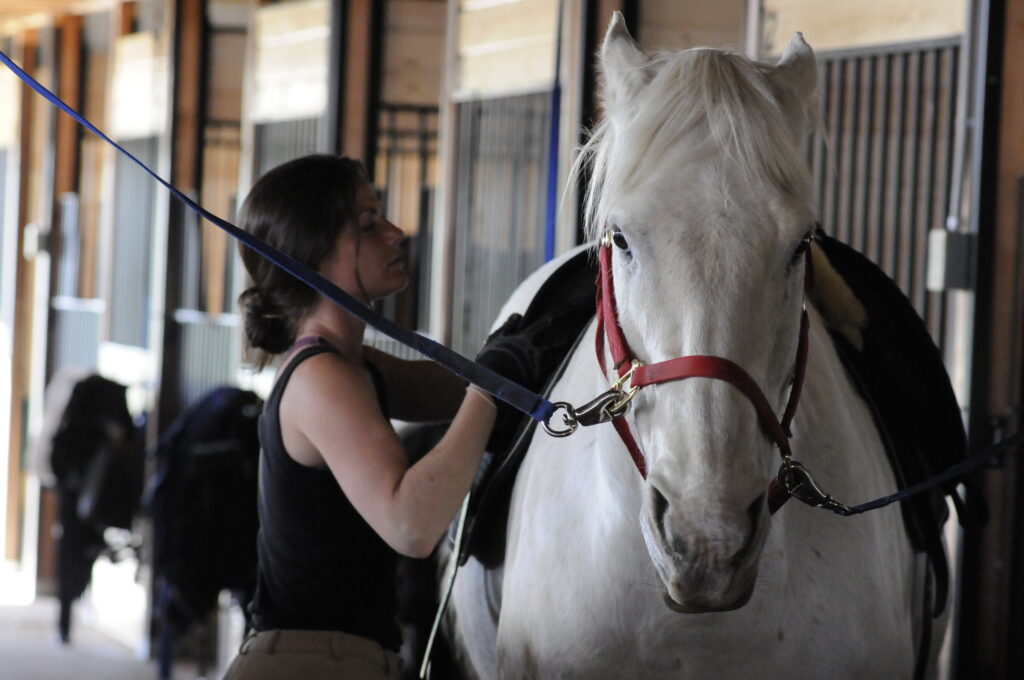
Q: My mare’s behavior changes dramatically during her heat cycles. She goes from sweet and agreeable to grumpy and unpredictable—sometimes even kicking out when being groomed and ridden. It’s almost as if she is suffering from menstrual cramps. I don’t plan to ever breed her, and I’d rather not pay for synthetic hormone treatments for years on end. Is there a safe spay surgery that I can have done on her, similar to the spaying done in cats and dogs?
PETER KNOX, DVM,
Diplomate, American College of Veterinary Surgeons
A: This is a common complaint among mare owners. Irritability, aggressiveness and pain are frequently linked to sex hormones released by the ovaries during heat cycles. In many cases, spaying, also known as an ovariectomy, may be an effective treatment. Ovariectomies reduce hormone levels by removing one or both ovaries. (Unlike dog and cat spays, the equine procedure does not remove the uterus.) For many mares, the result is often as transformative as the castration procedure we’ve done on colts for centuries—creating future career options that might have been limited by hormone-related behavior.
Some mares’ difficult behavior stems from strong heat cycles. Others’ symptoms result from a granulosa cell tumor on an ovary. These tumors are rarely malignant in horses, but they can grow as large as the size of a basketball. A third cause of abnormal behavior is a persistent anovulatory follicle—a follicle that fails to rupture normally during ovulation.
To be sure that your mare’s problem is connected to one of these sources, track her behavior and heat cycles. Write down how and when her behavior changes and record when her cycles begin and end. If, after several months, a clear pattern emerges correlating the two, ask your veterinarian to draw blood for hormone testing. Hormone assays have become more accurate in recent years, allowing us to diagnose tumors at much earlier stages. Another helpful diagnostic tool is a reproductive ultrasound, which your veterinarian can use to look for abnormally large and small ovaries. (When one ovary is larger than usual, the other tends to be smaller than usual.) This might indicate the presence of a tumor or persistent anovulatory follicle.
Trying synthetic hormone treatments, such as Regu-Mate® or injectable progesterone, for several months is also a good way to confirm that your mare’s problems are hormone-related. If she shows significant behavioral improvement, she may be a good surgical candidate.
The safest ovariectomy procedure is done laparoscopically, much like a human gall bladder surgery. It takes only about an hour with the horse standing in restraints under heavy sedation. Three small incisions are made in her flank to provide access for the viewing scope and surgical tools. In rare cases, mares with extremely large tumors may require a larger incision and general anesthesia. Although there is some inherent risk in any surgery, it is very low in this case because the surgeon can visualize the entire procedure and avoid or stop any bleeding, particularly from the structure that is severed to remove the ovary, the ovarian pedicle, which is fed by large blood vessels.
The most common postsurgical complications involve swelling and tenderness around the incision sites. Mares usually experience minimal pain upon recovery from sedation and are administered an anti-inflammatory, such as Banamine®, and a brief course of antibiotics to reduce risk of infection. They can go home the following day, have the external sutures removed two weeks later and resume light work after about three weeks. Cosmetic results are excellent, as the incision scars are barely visible after six months.
For behavioral purposes, most people elect to remove both ovaries. However, the procedure can be done on a single ovary, thus prolonging—or even improving—a mare’s reproductive potential. For example, removing an ovary enlarged by a granulosa cell tumor usually stimulates the other, smaller ovary to begin functioning normally again after a breeding season or two.
I do not recommend an ovariectomy procedure called a colpotomy. This is done “blindly” (without a laparoscope) through the vagina. Even when performed by very experienced surgeons, it has an increased risk of accidental injury to other organs, bleeding and post-surgical colic.
An ovariectomy won’t fix every grumpy mare. Positive outcomes are more likely in young mares than in older ones, whose behavior might be more ingrained. A small percentage of spayed mares will continue to cycle, but the behavioral signs will be less noticeable. In general, this is a safe procedure with a very high success rate, so it is definitely worth considering.
Peter Knox, DVM, grew up on his family’s horse-breeding and training farm in southeastern Idaho. A graduate A Pony Clubber and experienced tetrathlete, he coached the international U.S. Pony Clubs tetrathlon team in 1992. After graduating from veterinary school, he joined the staff at the Idaho Equine Hospital in Nampa, Idaho, as an intern in 2001 before doing his equine surgical residency at Texas A&M University from 2002 to 2005. He then returned to the Idaho Equine Hospital to become a member of its lameness and surgery team. Since becoming board-certified in large animal surgery in 2007, he has focused his work on lameness, sports medicine, laparoscopic surgery, fracture repair and equine dentistry. Dr. Knox and his wife, fellow veterinarian Robin Knight, have two young sons.
This article originally appeared in the February 2015 issue of Practical Horseman.


